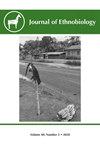行道树管理实践中的植物机构:纽约市城市绿色基础设施中的人与植物革命
IF 1.3
3区 社会学
Q1 ANTHROPOLOGY
引用次数: 0
摘要
在城市中,大自然正在扮演基础设施的新角色,提供温度调节和水资源管理方面的基本服务,并为保护生物多样性提供栖息地。在转向绿色基础设施的同时,维护工作也面临着新的挑战。植物是生机勃勃的,如果它们要发挥基础设施的作用,就必须以特定的方式进行日常养护。在新自由主义治理的背景下,这项工作主要由志愿者承担。这种促进植物-城市繁荣的志愿服务被称为 "管理",它既能满足维护需求,又能促进人类的健康和福祉,还能通过主人翁意识和责任感为基于自然的解决方案创造支持。因此,我们可以将管理工作理解为将人和植物纳入新自由主义城市政治生态的再生产中,但在本文中,我认为这种分析忽略了在管理工作中发生的植物和人的内卷化。通过对纽约市行道树管理者的人种学研究,我探讨了植物的作用是如何将人们吸引到情感和身体关系中的。在管理行为中,树木作用于人,并以可能超越管理要求的方式重构人与树木之间的关系。我们不应将管理论述及其批判作为理解这些人与植物关系的唯一框架,我们还应从植物能动性的角度来考虑这些关系,以及在人类的管理实践中、围绕着人类的管理实践以及人类与树木的关系所做的事情。本文章由计算机程序翻译,如有差异,请以英文原文为准。
Vegetal Agency in Street Tree Stewardship Practices: People-Plant Involutions Within Urban Green Infrastructure in New York City
In cities nature is taking on a new role as infrastructure, providing essential services in terms of temperature regulation and water management, as well as the provision of habitat for biodiversity conservation. With this turn to green infrastructure have come new challenges to maintenance. Plants are lively things and if they are to perform their infrastructural roles they must be routinely tended to in particular ways. In the context of neoliberal governance, much of this labor falls to volunteer humans. Framed as stewardship, this volunteerism for plant-city thriving is posited as a way to meet maintenance needs while promoting human health and well-being and creating support for nature-based solutions through a sense of ownership and responsibility. While it is thus possible to read stewardship as an enrollment of people and plants into the reproduction of neoliberal urban political ecologies, in this paper I argue that such an analysis overlooks the involution of plants and people that occurs during acts of stewardship. Drawing on ethnographic research with street tree stewards in New York City I explore how vegetal agency draws people into affective, embodied relations. During acts of stewardship, trees act on people and reconfigure their relations in ways that potentially exceed the strictures of stewardship. Rather than allowing stewardship discourses and critiques thereof to be our sole frame for understanding these people-plant relations, we should also consider them from the perspective of vegetal agency and what human-tree involutions do within, around, and to human practices of stewardship.
求助全文
通过发布文献求助,成功后即可免费获取论文全文。
去求助
来源期刊

Journal of Ethnobiology
Social Sciences-Anthropology
CiteScore
4.80
自引率
3.40%
发文量
21
审稿时长
>12 weeks
期刊介绍:
JoE’s readership is as wide and diverse as ethnobiology itself, with readers spanning from both the natural and social sciences. Not surprisingly, a glance at the papers published in the Journal reveals the depth and breadth of topics, extending from studies in archaeology and the origins of agriculture, to folk classification systems, to food composition, plants, birds, mammals, fungi and everything in between.
Research areas published in JoE include but are not limited to neo- and paleo-ethnobiology, zooarchaeology, ethnobotany, ethnozoology, ethnopharmacology, ethnoecology, linguistic ethnobiology, human paleoecology, and many other related fields of study within anthropology and biology, such as taxonomy, conservation biology, ethnography, political ecology, and cognitive and cultural anthropology.
JoE does not limit itself to a single perspective, approach or discipline, but seeks to represent the full spectrum and wide diversity of the field of ethnobiology, including cognitive, symbolic, linguistic, ecological, and economic aspects of human interactions with our living world. Articles that significantly advance ethnobiological theory and/or methodology are particularly welcome, as well as studies bridging across disciplines and knowledge systems. JoE does not publish uncontextualized data such as species lists; appropriate submissions must elaborate on the ethnobiological context of findings.
 求助内容:
求助内容: 应助结果提醒方式:
应助结果提醒方式:


